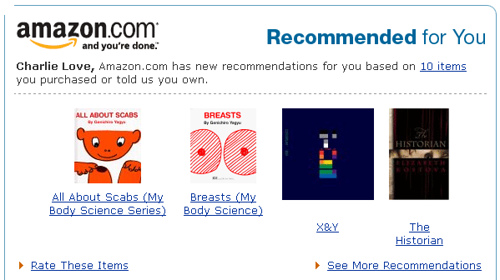Getting a clue about giving a clue
Whenever I receive a recommendation for a book from Amazon or a song from last.fm or a movie from Netflix, I like to know why they are recommending the item. They could be recommending it because I've purchased books by the same author, or listened to songs by the same artist - it could be that I have tastes similar to someone else who liked that item, or it could be that the company has received money from someone to recommend the item, or perhaps someone has figured out how to game the recommendation engine to give preference to their items.
If I am going to use a recommender I have to trust it, and in order for me to start trusting a recommender the recommender has to give me some idea as to why I am receiving the recommendation. Some recommender systems already do this. Pandora for instance, gives a good description of why they are recommending music -with statements such as "this song has prominent drums,R & B Influences and a Reggae Feel" . But most recommenders don't give you any idea. My favorite example is this recommendation from Amazon:

For some reason, Amazon has decided that there's a link between scabs, breasts and Coldplay.
Cameron
Marlow, a researcher at Yahoo's lab has an excellent post about how
recommenders are getting a clue about giving a clue - how there's a
trend in recommenders to give an explanation as to why an item was
recommended. Cameron rightly points out that Explanation creates understanding and understanding leads to trust. (and trust leads to suffering ... (whoops -wrong quote)).
Check out Cameron's blog post on overstated.net: Explanatory Algorithms
(tip of the hat to Adam)
Posted by Florian Laws on November 16, 2006 at 04:53 AM EST #